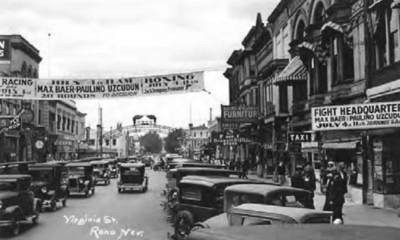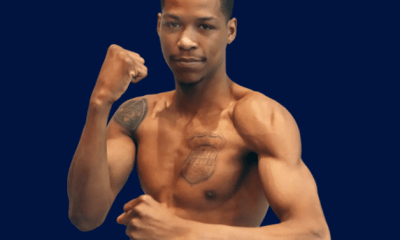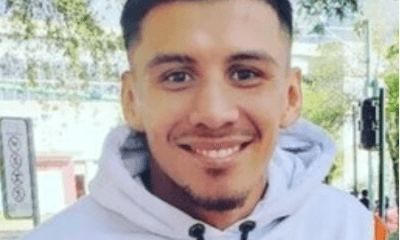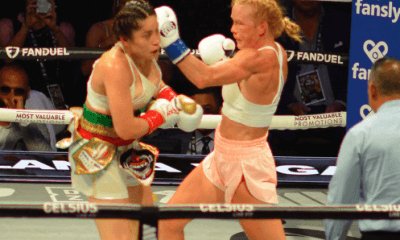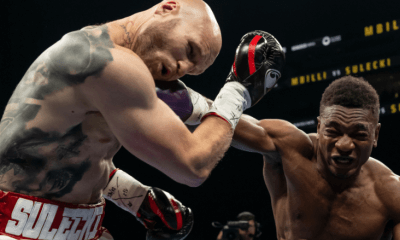Featured Articles
3 Punch Combo: Truax’s Improbable Upset, a Winky Wright Flashback and More
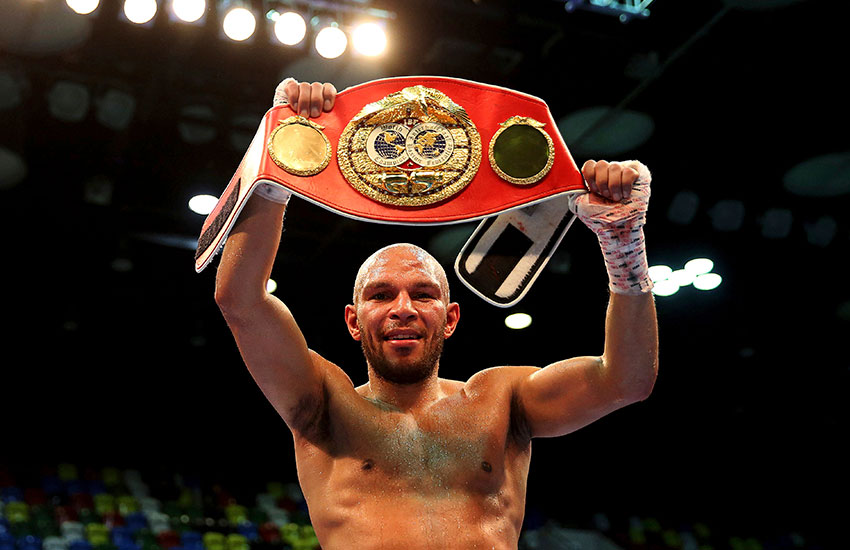
THREE PUNCH COMBO — Caleb Truax (29-3-2, 18 KO’s) stunned the boxing world this past Saturday scoring a majority decision win against the heavily favored James DeGale (23-2-1, 14 KO’s) to win a 168-pound belt. Truax is a great story of perseverance and seizing the moment in this sport. Ironically, nearly 20 years ago to the day another major upset also took place with a fighter in a very similar spot to that of Truax.
In 1997, Top Rank was seeking opponents for their cash cow Oscar De La Hoya. That year, they signed Terry Norris with the idea of matching Norris with De La Hoya sometime in 1998 in a big pay-per-view event. With the fight essentially signed, Top Rank wanted to build that event by placing Norris and De La Hoya together on a big card. De La Hoya would headline on December 6th, 1997 in Atlantic City, NJ against Wilfredo Rivera while Norris would have his showcase bout as the chief support against journeyman Keith Mullings.
Mullings entered the ring that night with a pedestrian record of 14-4-1 and was coming off a hard fought loss to Raul Marquez three months earlier. Known as a durable guy with limited skills and not much of a punch, Mullings seemed to be the perfect safe opponent to showcase the abilities of Norris and help build toward a super fight with De La Hoya.
In the early going, the fight went to script. Norris controlled the early rounds and seemed to be on his way to an easy victory. But midway through the scheduled 12-round fight, Mullings began bouncy castle with pool to slowly turn the tide. After scoring a knockdown of Norris in round eight, the realization began to seep in that we could be in store for a mega upset. In the ninth, Mullings hurt Norris and pounced on him, throwing a barrage of punches which eventually forced the referee to stop the contest.
Similar to Norris, DeGale seemingly had a big fight lined up himself with a unification bout with David Benavidez on the horizon. Much like Mullings, Truax was hand-picked to showcase the skills of DeGale prior to him going on to bigger things. And similar to Mullings, Truax refused to read that script. Instead, Truax had a plan of his own and executed that plan to perfection to pull the stunning upset. Now it is Truax who is on the brink of much bigger things as we head into 2018.
Remembering Winky Wright’s First Attempt at a World Title
The International Boxing Hall of Fame announced its class of 2018 this past week and one of the inductees in the Modern category was Ronald “Winky” Wright. Wright had an amazing career and is well deserving of being enshrined in Canastota. It was a career of patience and perseverance as he is remembered most for the bouts that took place toward the tail end of his career. What has been forgotten about Wright are some of his earlier fights and the long journey he took to reach the pinnacle of the sport.

One of Wright’s most memorable fights from the early part of his career was his first attempt at a world title against Julio Cesar Vasquez on August 21, 1994 in France. Wright (25-0, 18 KO’s) was still relatively green at this point in his career and was facing a very seasoned champion in Vasquez (50-1, 35 KO’s) who had held the title for nearly two years, having already made eight successful defenses.
Wright set a blistering pace in the first round, beating Vasquez to the punch working fast combinations behind a stiff right jab. The second round saw a little controversy as a counter right hand from Wright put Vasquez on the canvas but was not counted as an official knockdown. Later in that round, Vasquez would land his first significant punch of the fight with a counter left uppercut that put Wright on the canvas. This was counted as a knockdown and Wright arose willing to go toe to toe with Vasquez as the round came to a close.
The next three rounds saw Wright work combinations behind the jab and out-box Vasquez. Wright’s speed and boxing ability were giving the aggressive Vasquez all sorts of issues.
In round six, Wright appeared to be getting a little tired. Vasquez’s pressure seemed to be getting to him and Vasquez enjoyed his best round since the second, landing with consistency a hard left to Wright’s head.
Wright was dropped for the second time in the fight in the seventh. But he would get up again and after surviving the initial onslaught go to war with Vasquez for the remainder of the round. The eighth saw Wright turn the tables and hurt Vasquez with a sweeping right hook. It would be the best round for Wright since the fifth.
But again in round nine, Wright would get deposited on the canvas, this time from an overhand left. Wright was visibly hurt but resilient, not only in getting to his feet but surviving the remainder of the round.
Looking fatigued, Wright’s punch output slowed the next two rounds as Vasquez stepped up the pressure, raking Wright with hard shots to the head and body. In the twelfth and final round, Vasquez would put a totally gassed Wright down two more times. Wright did well just to hear the bell.
The decision would be unanimous for Vasquez. But this was one tremendous fight and a learning experience for Wright who showed incredible courage and fortitude. He fought his heart out and though he came up short this night set the foundation for what would later become a Hall of Fame career.
Under The Radar Fights
Well the last big boxing weekend of 2017 is upon us. There is plenty of action in store before a bit of a reprieve. With so many bouts, there are bound to be some that are flying severely under the radar.
On Friday as part of the PBC on FS1 broadcast, Jamal James (21-1, 9 KO’s) battles Diego Chaves (26-2-1, 22 KO’s) in an evenly matched 147-pound crossroads fight. James was once a highly-thought-of prospect but a 2016 loss to Yordenis Ugas knocked James back a rung on the ladder. He rebounded earlier this year with a solid win against former world title challenger Ionut Dan Ion and looks to build on that performance against Chaves.
James has solid skills and is a well-rounded fighter. A boxer-puncher by trade, he will look to work behind the jab using his legs to set up angles to fire off combinations. James has a bit of slickness to him and will need that against Chaves. Chaves knows only one way to fight and that is to bring pressure from the opening bell. He will look to make this a rough and tumble fight on the inside. And Chaves will not be afraid to bend the rules some to lure James out of his game plan into a firefight. It is an interesting clash of styles and should be a solid entertaining scrap.
On Saturday as part of HBO’s tripleheader, once-beaten 160 pound prospect Antoine Douglas (22-1-1, 16 KO’s) takes on rugged veteran Gary O’Sullivan (26-2, 18 KO’s) in a scheduled 10-round contest. Douglas is a skilled prospect who seemed to be on the verge of a title shot before getting derailed by Avtandil Khurtsidze in March of 2016. Since that loss, Douglas has scored three straight knockout wins, albeit against less than formidable opposition. Douglas is athletically gifted and possesses very fast hands. He is a natural boxer puncher and will work combinations with his quick hands behind a sharp left jab.
In O’Sullivan, Douglas is facing an opponent in a similar mode to Khurtsidze. O’Sullivan will apply constant pressure. He may not be a one punch knockout guy but has relatively heavy hands and will try to overwhelm opponents with volume. O’Sullivan is not known for his defense and opponents usually find him to be a very easy target. He can be out-boxed by more skilled fighters as evidenced in his two losses to Billy Joe Saunders and Chris Eubank Jr. The question here is whether or not Douglas can get the respect of O’Sullivan early to discourage him from unloading a high volume of punches. If Douglas can, it could be easy work for him. If he can’t, we may see a replay of the Khurtsidze fight.
It has been quite a year in boxing in 2017. And we are going out with a bang with one last big week of action. Though the above fights may not be getting the press of some of the other bouts taking place this coming week, these should be entertaining fights and should not be missed.
To comment on this article at The Fight Forum, CLICK HERE.
Check out more boxing news on video at The Boxing Channel.
-

 Featured Articles3 weeks ago
Featured Articles3 weeks agoAvila Perspective, Chap. 330: Matchroom in New York plus the Latest on Canelo-Crawford
-

 Featured Articles2 weeks ago
Featured Articles2 weeks agoVito Mielnicki Jr Whitewashes Kamil Gardzielik Before the Home Folks in Newark
-

 Featured Articles4 weeks ago
Featured Articles4 weeks agoAvila Perspective, Chap 329: Pacquiao is Back, Fabio in England and More
-

 Featured Articles4 weeks ago
Featured Articles4 weeks agoOpetaia and Nakatani Crush Overmatched Foes, Capping Off a Wild Boxing Weekend
-

 Featured Articles3 weeks ago
Featured Articles3 weeks agoCatching Up with Clay Moyle Who Talks About His Massive Collection of Boxing Books
-

 Featured Articles4 weeks ago
Featured Articles4 weeks agoFabio Wardley Comes from Behind to KO Justis Huni
-

 Featured Articles1 week ago
Featured Articles1 week agoMore Medals for Hawaii’s Patricio Family at the USA Boxing Summer Festival
-

 Featured Articles4 weeks ago
Featured Articles4 weeks agoDelving into ‘Hoopla’ with Notes on Books by George Plimpton and Joyce Carol Oates

